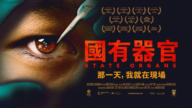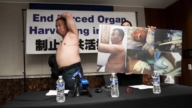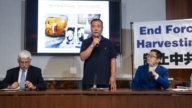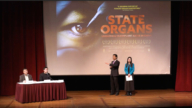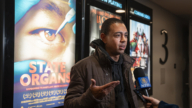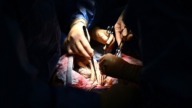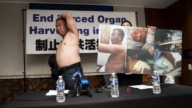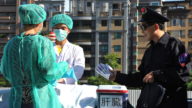【新唐人2015年01月05日讯】中共从今年1月1号将不再依赖死囚器官的说法,在2015新年伊始,就受到外界关注。美国广播公司(ABC)发文说,中共这一说法遭到外界质疑,当局的声明是否能带来真正的改变。还有人则怀疑中共是在掩盖活摘器官的真相。
美国广播公司(ABC)1月1号报导,中共前卫生部副部长黄洁夫,在去年12月份宣称“从1月1日开始,中国将结束它依赖死囚器官移植的做法。”这一说法遭到质疑。
文章引用美国人权观察中国部主任的话说,中国器官买卖当中,存在相当大的经济利益,而囚犯受到的保护极度薄弱,加上政府也没有意愿处分那些违反政策的官员和医生,这些都令人怀疑,中共的宣布将不会带来任何真正的改变。
时事评论员李善鉴:“当它承认又想去解决的时候,国际上很多的主要的媒体,就会把注意力相对集中在死囚犯身上。而它更邪恶的,也就是活摘器官的问题,关心的人就少了,很大程度上它是转移了国际社会的注意力,我觉得这是它根本的目的。”
不过,黄洁夫自相矛盾的说词,没法掩盖他的谎言。据大陆媒体报导,现阶段中国公民死后器官捐献率只有100万分之0.6,属于世界上器官捐献率最低的国家之一。这无法满足正常的医疗需求。
去年12月19号,黄洁夫访问台湾时,又声称要建立两岸器官移植平台,将大陆器官输出台湾。
在此之前不到一个月,即11月23号,中共当局成立人体器官获取组织,名誉主席正是黄洁夫,主席是中华医学会器官移植学分会主任委员郑树森院士。
“追查迫害法轮功国际组织”对这两人多次发出追查令,认定他们是活摘法轮功学员器官罪行的主要罪犯。
“追查国际”发言人汪志远表示,中共成立这个器官获取组织,正是为了掩盖器官来源的真相。而黄洁夫和郑树森这两人成为主席,恰恰说明这一组织和活摘器官的罪恶有关。
大陆退休医生付女士:“我告诉你,现在活摘器官的事情在国内几乎都知道,为什么15年1月1号起在死刑犯身上它停止啊,不就是已经意识到压力,不已经都承认了嘛!”
其实,中共在器官移植来源上一直出尔反尔。
2001年,当中共军医王国齐在美国听证会上作证,说出中共有组织活摘死囚器官贩卖后,中共一直矢口抵赖,谎称所有器官来源于器官捐赠。
2006年,《大纪元时报》首度揭开沈阳苏家屯活摘集中营黑幕,震惊世界。同年11月,黄洁夫改口,声称器官移植来源使用的是“死囚器官”。
由于中共不肯公开真实的死刑数据,人权组织估计,中国每年大约有数千人被处死,还存在一个配型成功率问题。那么在被指控活摘法轮功学员器官高峰期的2003年到2006年,每年1万5千例的器官移植来源于哪里?
美国伦理公共政策中心资深研究员George Weigel曾经一针见血指出:被中共控制的中国医学界已沦为“杀人企业”。
除了法轮功学员器官被活摘,近年来,病人就医时器官被盗的事件也时有发生。2011年,河北邯郸的尿毒症患者高兵强,查出自己的左肾缺失。他怀疑唯一进行过手术的医院邯郸市第一医院“偷”了他的肾。
去年8月,山西男童小斌斌双眼被挖,眼角膜被盗﹔同年7月,陕西红会曾以停止呼吸机要胁病人签署器官捐献
时事评论员李善鉴指出,当大陆不法医生已经习惯于盗取器官获取高额利润,不再方便盗取法轮功学员器官时,他们就会想法设法盗取其他人的器官。
著名媒体人洪晃日前刊文,否认她母亲章含之的肾移植来源于冤死的聂树斌。不过,她写道,章含之的两次换肾,两家医院都没有透露肾源。而作为病人和家属,只是庆幸在需要时,能够及时找到匹配的器官,却从来没有打听过器官的来源,是因为有一种感觉,其中的过程可能很恐怖。
采访编辑/刘惠
ABC: Doubts No More Harvesting Executed Prisoners’ Organs
The claim to end the practice of harvesting organs
from executed prisoners on Jan. 1 has drawn much attention.
While ABC News reported skepticism that the Communist
regime’s pronouncement would bring about any real change,
many more people suspect an intention
to cover up live organ harvesting.
“Starting from January 1, China will end its reliance
on the organs of executed prisoners for transplantation",
the vice minister of health Huang Jiefu said in early December,
reported ABC.
But, China Director for Human Rights Watch was skeptical
the Government pronouncement would bring about
any real change.
She said, “There are considerable economic interests
in the organ trade that are to a large extent unaddressed
by this policy,
and the government’s willingness to discipline
those in official positions — be they prison guards or
administrators or doctors — who violate such policies is scant ."
Commentator Li Shanjian: “When CCP admitted and showed
they want to resolve it,
international media focussed on death row prisoners.
What’s evil about it is that live organ harvesting
is rather ignored.
The international community is rather distracted,
and I think that’s their purpose."
However, Huang Jiefu’s contradictory rhetoric can’t cover
up his lies.
With the ratio of public organ donations being 0.6 to 1,000,000
Chinese people, one of the lowest in the world, there is a
dramatic shortage of donors for transplant needs in China.
During his visit to Taiwan on Dec.19, 2014,
Huang even addressed to establish a cross-straits transplant
platform for organ output from the Mainland.
On Nov. 23, China’s organ procurement organization (OPO)
was established with honorary chairman Huang Jiefu,
and chaired by Shu-Sen Zheng, chairman of Chinese Medical
Association of Organ Transplant.
World Organization to Investigate the Persecution of
Falun Gong (WOIPFG) has issued multiple notices
to investigate both Huang and Zheng.
Both are suspected to be the main criminals in practicing
live organ harvesting from Falun Gong practitioners.
WOIPFG spokesman Wang Zhiyuan believes the OPO was
established to exactly cover up the real donor sources.
Their being the chairs of the OPO explains precisely
the relation of OPO with the crime of live organ harvesting.
Miss Fu, a retired Chinese doctor: “I tell you, live organ
harvesting is known to nearly all Chinese.
Why do they stop organ harvest from executed prisoners
on Jan. 1 of 2015?
It is because of the pressure. It is equivalent to admitting to it!"
In fact, the Communist regime has been inconsistent
about the source of organs.
In 2001, Chinese doctor Wang Guoqi testified
before the US Congress that coordinated procedures existed
between surgeons and regime officials to harvest and sell
the body parts of executed prisoners.
The regime denied it and claimed the major source of human
organs came from voluntary donations from Chinese citizens.
In 2006, the Epoch Times exposed the shady and shocking
Shenyang Sujiatun concentration camp for live organ harvesting
for the first time.
In November, Huang Jiefu changed his tone and claimed that
the source of organ transplants came from executed prisoners.
Despite the true death row figure not being available from
the regime, human rights organizations estimate the regime
executes thousands of prisoners a year.
Along with the rare matching rates, the annual 15,000 cases
of transplant in China that occurred between 2003 and 2006
when the live organ harvesting from Falun Gong practitioners
was believed to peak, poses the question
of the source of the organs.
George Weigel, a distinguished Senior Fellow of the Ethics
and Public Policy Center, once bluntly stated,
“there is government-run Chinese medicine,
which has become a lethal enterprise."
Additionally, organ theft from inpatients is also often heard of
in China these years.
In 2011, a uremic patient Gao Bingqiang from Handan,
Hebei Province, found out his left kidney was missing.
He suspected that the First Hospital of Handan City
where he had his only surgery ‘stole’ his kidney.
Last August, Shanxi boy Binbin’s eyes were dug out and corneas
were stolen.
Last July, in another case, Shaanxi Red Cross threatened
to switch off a respirator if a patient refused to sign
an organ donation form.
Li Shanjian indicates that unscrupulous doctors are accustomed
to the high profit of organ sales.
When it is not so easy to steal organs of Falun Gong
practitioners, they find ways to steal other people’s organs.
Famous media figure Hung Huang recently denied her
mother’s (Communist politician) kidneys came from
the unjustly executed Nie Shubin.
However, she also wrote that, her mother twice experienced
kidney transplants and the two hospitals never revealed
the source of the kidneys.
“As the patient and the family, we were only feeling lucky
to find matching organs in time but never thought of
finding out the source of the organs.
It is because we had the feeling that horrifying procedures
could have been involved."
Interview & Edit/LiuHui


